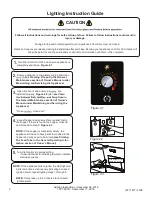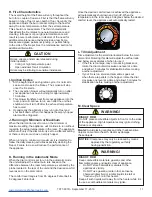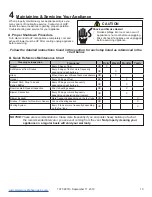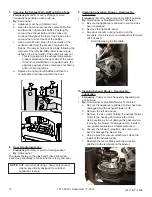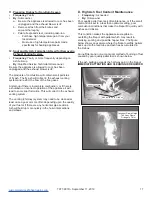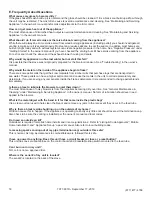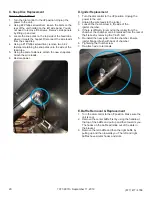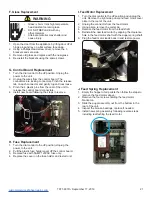
7077-801D • September 17, 2019
7
A. Fire Safety
To provide reasonable fire safety, the following should be
given serious consideration:
•
Install at least one smoke detector on each floor of
your home.
•
Install at least one carbon monoxide detector on each
floor of your home.
•
Locate smoke detector away from the heating
appliance and close to the sleeping areas.
•
Follow the smoke detector manufacturer’s placement
and installation instructions and maintain regularly.
•
Follow the carbon monoxide manufacturer’s placement
and installation instructions and maintain regularly.
•
Conveniently locate a Class A fire extinguisher to
contend with small fires.
•
In the event of a hopper fire:
-
Evacuate the house immediately.
-
Notify fire department.
B. Combustible/Non-Combustible Materials
• Combustible Material
-
Material made of or surfaced with wood,
compressed paper, plant fibers, plastics, or any
material capable of igniting and burning, whether
flame-proofed or not, plastered or non plastered.
• Non-combustible Material
-
Material which will not ignite and burn. Such
materials are those consisting entirely of steel,
iron, brick, tile, slate, glass or plasters, or any
combination thereof.
• Non-combustible Sealant Material
-
Sealants which will not ignite and burn: Rutland,
Inc. Fireplace Mortar #63, Rutland 76R, Nuflex
304, GE RTV106 or GE RTB116 (or equivalent).
C. Fuel Material and Fuel Storage
Pellet fuel quality can greatly fluctuate. We recommend that
you buy fuel in multi-ton lots whenever possible. However,
we do recommend trying various brands before purchasing
multi-ton lots to ensure your satisfaction.
Fuel Material
•
Made from sawdust or wood by-products
•
Depending on the source material it may have a high
or low ash content.
Higher Ash Content Material
•
Hardwoods with a high mineral content
•
Fuel that contains bark
•
Standard grade pellets or high ash pellets
Lower Ash Content Material
•
Most softwoods
•
Fuels with low mineral content
•
Most premium grade pellets
D. Before Your First Fire
1. First, make sure your appliance has been properly
installed and that all safety requirements have been
met. Pay particular attention to the fire protection
and venting.
2. Double check that the firebox is empty and the firepot
is in place!
3. Close and latch the door.
Clinkers
Minerals and other non-combustible materials such as
sand will turn into a hard, glass-like substance called a
clinker when heated in the firepot.
Trees from different areas will vary in mineral content. That
is why some fuels produce more clinkers than others.
Moisture
Always burn dry fuel. Burning fuel with high moisture
content takes heat from the fuel and tends to cool the
appliance, robbing heat from your home. Damp pellet fuel
can clog the feed system.
Size
•
Pellets are either 1/4 inch or 5/16 inch (6-8mm)
in diameter
•
Length should be no more that 1-1/2 inches (38mm)
•
Pellet lengths can vary from lot to lot from the same
manufacturer
•
Due to length variations, the feed rate may need
adjusting occasionally
Performance
•
Higher ash content requires the firepot and the ash
drawer to be emptied more frequently
•
Hardwoods require more air to burn properly
•
Premium wood pellets produce the highest heat output
•
Burning pellets longer than 1-1/2 inches (38mm) can
cause an inconsistent fuel feed rate and/or missed
ignitions of feed jams.
Storage
•
Wood pellets should be left in their original sealed bag
until using to prevent moisture absorption
•
Do not store any pellet fuel within the clearance
requirements or in an area that would hinder routine
cleaning and maintenance
User Guide
2
General Information


